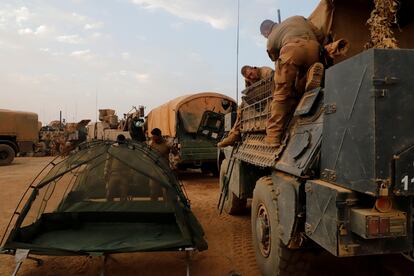Jihadist group kills 132 civilians in central Mali
The massacre has been blamed on Katibat Macina, a jihadist group linked to Al Qaeda

Alleged members of Katibat Macina, a jihadist group linked to Al Qaeda, killed at least 132 civilians in central Mali this past weekend, the Malian government reported in a statement on Monday. The attacks took place between Saturday afternoon and Sunday, when armed men on motorcycles entered three nearby villages in the Bandiagara area. There they executed civilians, mostly men, and set fire to houses, barns and vehicles, forcing the rest of the community to flee towards Bankass, some 40 kilometers (25 miles) away.
Local sources say that the three villages – Diallassagou, Dianweli and Deguessagou – were attacked in revenge as some residents in these areas had worked with the Malian army and Russian mercenaries in anti-terrorism operations. The same sources confirmed that jihadists tried to attack the towns of Segue and Djiguibombo, but were pushed back by traditional Dozo hunters and armed Dogon militiamen.
The Bandiagara area, near the border with Burkina Faso, is often targeted by jihadists. Violent attacks have been on the rise since 2015, when the focus of the Mali War moved to the center of the country. This move coincided with the emergence of the Macina Liberation Front, a militant Islamist group led by radical preacher Amadou Koufa. The Malian government announced that Koufa had died in 2018, but numerous sources familiar with the conflict affirm that he is still alive in the central area of the country.
The Macina Liberation Front, which later changed its name to Katibat Macina, was integrated under the umbrella of the Jama’at Nasr al-Islam wal Muslimin (JNIM), whose name means the “Group for the Support of Islam and Muslims.” This group is led by the Tuareg militant Iyad Ag Ghali and linked to Al Qaeda. Katibat Macina, which has carried out numerous attacks in the Mopti and Ségou communes, is mainly made up of members of the Peul ethnic group. For this reason, members of the Dogon ethnic group, the majority in the Bandiagara area, have accused the Peul of acting in complicity with jihadists, which has led to many massacres in recent years. Faced with the weakness – or complete absence – of state institutions, local communities have reached agreements with the Macina Liberation Front: protection in exchange for money.
The United Nations Multidimensional Integrated Stabilization Mission in Mali (Minusma) condemned the massacre on Monday and offered to send a mission to protect citizens and stabilize the area. The Malian government also strongly condemned the violence in a statement, and said it will continue to “search and destroy terrorist havens” through the anti-terrorism operations “Maliko” and “Keletigui.”
The Mali War began in the north of the country in 2012 and then spread to the center and neighboring Niger and Burkina Faso. More than 25,000 people have died in the armed conflict and another four million have been displaced. Mali’s military junta has been unable to stop the violence. Meanwhile, the French Barkhane operation, which once had 5,500 troops deployed in the Sahel, is withdrawing from Mali due to disagreements between the leaders of both countries. Since last year, Mali has also been relying on Russian instructors and mercenaries from the shadowy Wagner Group to support their fight against the jihadists.
Tu suscripción se está usando en otro dispositivo
¿Quieres añadir otro usuario a tu suscripción?
Si continúas leyendo en este dispositivo, no se podrá leer en el otro.
FlechaTu suscripción se está usando en otro dispositivo y solo puedes acceder a EL PAÍS desde un dispositivo a la vez.
Si quieres compartir tu cuenta, cambia tu suscripción a la modalidad Premium, así podrás añadir otro usuario. Cada uno accederá con su propia cuenta de email, lo que os permitirá personalizar vuestra experiencia en EL PAÍS.
¿Tienes una suscripción de empresa? Accede aquí para contratar más cuentas.
En el caso de no saber quién está usando tu cuenta, te recomendamos cambiar tu contraseña aquí.
Si decides continuar compartiendo tu cuenta, este mensaje se mostrará en tu dispositivo y en el de la otra persona que está usando tu cuenta de forma indefinida, afectando a tu experiencia de lectura. Puedes consultar aquí los términos y condiciones de la suscripción digital.









































